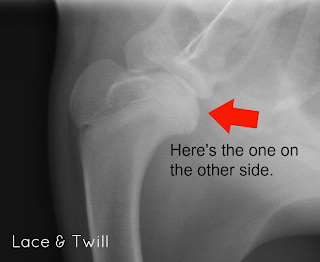 |
| Ozzie at the vet. |
I have an enormous amount of respect for the vet and staff at the shelter, but I decided I was too impatient to wait. We had already been considering making Ozzie a permanent member of our family, so I brought him to my vet. She and her staff are saints, and after 23 tries (and some excited weeing from Ozzie, sigh) they were able to get some good images without sedation. She was also able to pinpoint the source of his pain; both of his shoulders, the left a little worse than the right. The X-rays confirmed her suspicion; Ozzie had OCD.
"OCD?" you say, "But isn't that a brain thing?" Well, yes. I think it's safe to say most people are at least a little familiar with Obsessive Compulsive Disorder, and while dogs can suffer from that as well (especially certain breeds, such as bull terriers), this was the other kind of OCD. Ozzie had been dealing with Osteochondrosis. In layman's terms, Osteochondrosis (OCD) is a condition where a lesion forms on the top of the leg bone that intersects in the shoulder joint. In technical terms, that area of bone is the humeral head. To compensate, the body forms a cartilage flap over the lesion, which can grow quite large and cause pain with movement. Ozzie had lesions on both sides, with the left looking worse than the right.
 |
| Where the arrow is pointing, you may be able to detect a small divot where it looks like the bone should be rounded but instead dips inward. |
OCD has a few causes that can either work together or alone to cause the defect. The primary culprits are genetics, poor nutrition, and too much exercise. By poor nutrition, I don't necessarily mean low quality food, but certain foods are not recommended for puppies because they can cause rapid growth. OCD usually begins around a period of rapid growth, so it is thought those factors could be linked. Since Oz is a pound puppy, we can't know what caused his OCD for sure, but he does have a couple risk factors. OCD tends to affect large and giant breed dogs, and males are more at-risk than females. We're not sure what breeds make up his background, but at about 50 lbs. at 8 to 10 months, it's safe to say he's a large breed boy.
So, of course my next question was, "OK, what now?" Given that we had done the limited activity and anti-inflammatory drug route, our only other option was surgery, and he had to have it soon. Oh boy. Now, some people might not have quite the same reaction as I do when they hear their spastic foster puppy has a major medical problem that requires an expensive surgery to fix, but at that moment, after the little voice in my head was done shrieking, I thought, "I have to have him. And I have to fix him."
My vet went over the options with me. She knows of several board-certified surgeons who would be great for the job, but she recommended arthroscopic surgery and honed in on a list of surgeons with the facilities for that kind of operation. She gave me a ballpark figure that almost made me wet myself, and promised to call around for prices. Who needs savings anyway? I'm young, I can rebuild my nest egg. Sigh. Cue the "Why can't you adopt a healthy dog?!" line from my mother.
What prompted her to say that? Well, Brugge, despite not yet reaching two years of age, has a few different health issues. That's another story for another time. My answer? They need me. I could have adopted Willem and/or Tim, who were perfectly healthy despite their rough beginning; the time when they really required special care was short-lived. I'm a bleeding heart, so I feel I must reserve space in my home for dogs that really need a higher level of care, something other people might balk at, for issues that could (and do) land dogs in shelters. I've had two vets and three trainers tell me "Brugge is so lucky she found you; most people won't deal with this." With the "this" being either her boundless energy, high level of intelligence, chronic health problems, or some combination of the three. Dealing with various health concerns of my own throughout my life and having people who never gave up on me has made me want to pay it forward. But enough about me.
The quotes came in, and I picked a surgeon at a local specialty hospital. We met for his pre-op, and I was extremely impressed. Ozzie is enthusiastic, as many puppies his age (8 to 10 months at the time) are, and the surgeon took it all in stride. He hopped up in her lap, and she just said "Well you know what happens when you hop on a vet? You get examined!" and proceeded to check out his mouth. We discussed the procedure, she drew pictures, and we went over recovery and prognosis. The good news; Ozzie was an excellent candidate for the surgery they should be successful. The bad news; recovery is very drawn-out and demanding, and he may never be a completely normal dog. With all OCD dogs, there is an increased likelihood for osteoarthritis. However, due to the placement, his should be minimal. We just need to minimize his high-impact activities. Sorry, Oz, no high jump for you!
 |
| The day he came home; note the wagging tail! He has an irrepressible happiness. |
http://www.acvs.org/animalowners/healthconditions/smallanimaltopics/osteochondrosisoftheshoulder/
http://www.vetsurgerycentral.com/shoulder.htm
http://www.peteducation.com/article.cfm?c=2+2084&aid=464


No comments:
Post a Comment